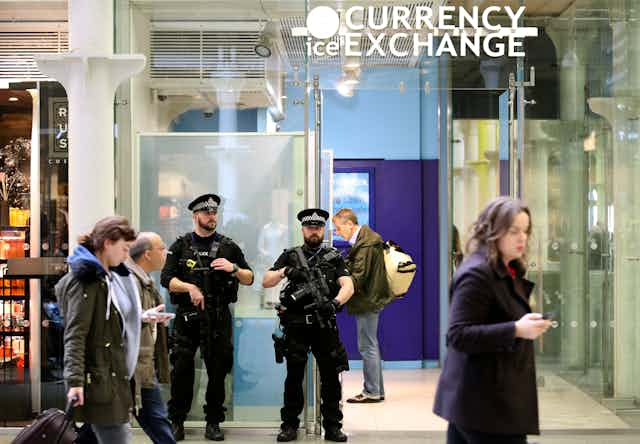Coming in the wake of Friday’s horrific attacks in Paris, David Cameron’s announcement that the British government is funding 1,900 extra security and intelligence staff and doubling funds for aviation security is an understandable response to the increasingly troubling problem of identifying terror plots before they happen.
Cameron’s new funding package is not directly a result of the Paris atrocities, but of the mounting threat of returning Syrian fighters to Britain, the danger of Islamic State terrorists entering the country under cover of being refugees and fears that IS will try to bring down a British airliner. There can be little doubt that the IS caliphate project has already inspired a small but worrying number of indigenous Islamic extremists in the UK as in other parts of Europe.
Outlining the extra resources, the prime minister said:
That means we can now invest more in our national security and I am determined to prioritise the resources we need to combat the terrorist threat because protecting the British people is my number one duty as prime minister.
The increase in funding to security at a time when other public services are being heavily cut reflects the difficulties the security services are experiencing. One of the key problems – and one that is only too clearly shown by the Paris attacks – is that some of those responsible for an attack were known to police and intelligence agencies.

But how to keep an eye on all suspects? Clearly the Belgian, French and German intelligence services could not. It is not a new problem. In the UK, the converts who killed Fusilier Lee Rigby had come up on the security services’ radar as did some of those involved in the UK 7/7 and 21/7 attacks in 2005 – notably the 7/7 leader, Mohammed Siddique Khan, a community worker from Yorkshire.
Human touch
It has been asked whether the obsession with digital surveillance has overshadowed traditional, tried-and-tested surveillance and intelligence techniques? Obviously something went wrong when Belgium-based suspects known to the Belgian security agencies were able to hit Paris without warning and no one picked up the “chatter” that usually accompanies these terror acts.
In the UK, the situation is more complex than changing the emphasis from Signals Intelligence (Signit) to Human Intelligence (Humint). The Government Communications Headquarters (GCHQ), “the eavesdropping agency”, monitors communications between suspected terrorists both in the UK and elsewhere. Other intelligence agencies gather information from sources and tracking, with MI5 working in the UK and MI6 outside. This information is brought together and assessed. It is now very integrated. Much has been learnt in the past 15 years in the UK.
As the head of MI5 Andrew Parker recently said:
7/7 transformed our counter terrorism operations. Since the early 2000s, MI5 has doubled in size to around 4,000 members of staff, and the vast majority of that growth has been in our counter terrorism work, which now makes up more than two-thirds of our effort. We have developed a highly sophisticated and integrated response, working with the police, SIS and GCHQ and other partners.
Developing threat
The urgent problem is dealing with the sheer number of new suspects and then estimating how much of a threat each suspect appears to pose and therefore how closely they should be monitored. A key question is asked: “Do they seem to be involved in a live plot?”

Herein lies the rub, as keeping a suspect under constant monitoring is not only difficult but consumes huge resources. Electronic surveillance is not foolproof. Human surveillance works better but it takes about 24 MI5 officers to keep one suspect under 24/7 surveillance. This is why a considerable chunk of the new funds and manpower are going to MI5. Meanwhile, GCHQ is in the process of building vast computer processing and storage power. The security forces certainly cannot monitor every suspect 24 hours a day.
The threat keeps changing. Even by the time of 9/11, MI5 believed it had neutralised every known al-Qaeda operative in the UK. With Britain’s ability to monitor its borders – being an island nation which is not part of the Schengen agreement – the problem for UK security forces has mostly been “home-grown” terrorists.
However the Syrian and other Middle Eastern conflicts have created new and considerable dangers. Many young British people have gone to fight with the Islamists. It is estimated that at least 450 have returned, some known and some unknown. Many will want a quiet life after the horrors of fighting but others will be zealots. There have been claims some evidence from the Paris attacks, so far unconfirmed, suggests that IS may be sending terrorists into Europe posing as refugees. Finally, it is almost certain that an IS bomb brought down the Russian jet in Sinai last month. This new tactic explains the doubling of funding for aviation security.
With the UK still reeling from the emotional impact of the Paris attacks, the prime minister’s decision to upgrade UK surveillance capability will seem appropriate. However, it is also important that oversight and accountability of the UK state security apparatus is expanded proportionally. We are building a state security apparatus of unprecedented power and reach. We need to ensure it works.

